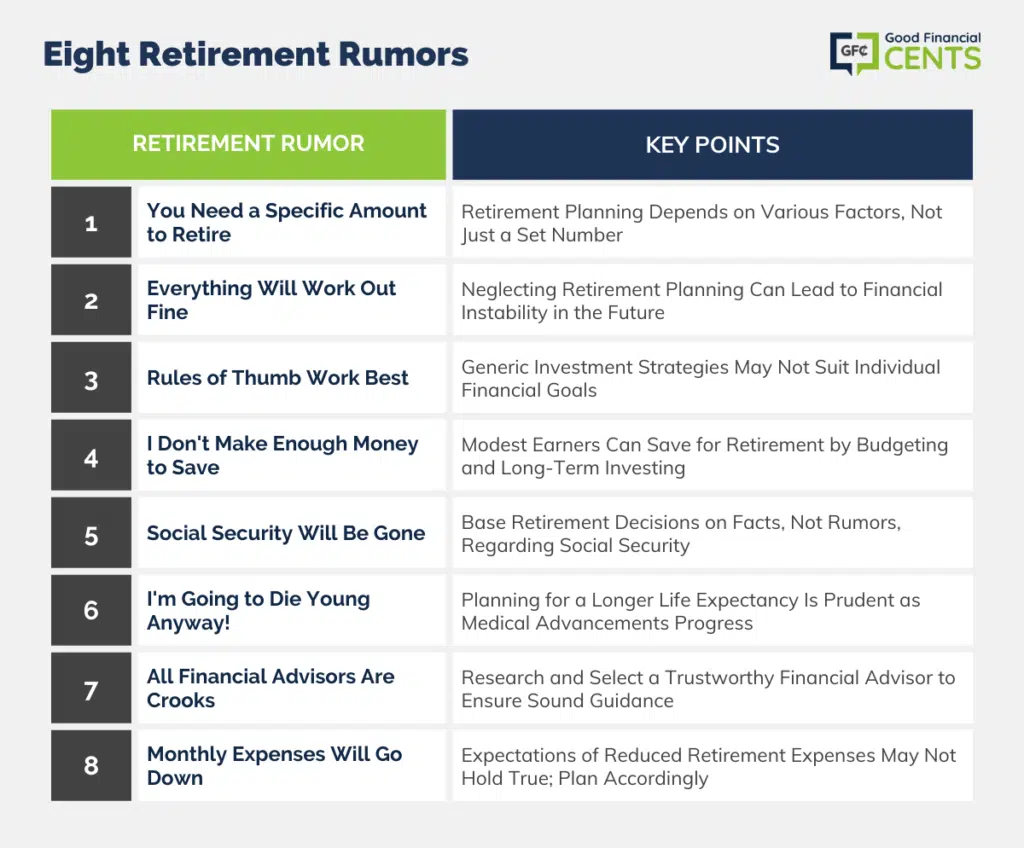As a financial planner who has been around for a while, I’ve overheard plenty of wild claims about retirement and money.
If I had a dollar for every person who told me their whole life insurance plan worked like a savings account or that their variable annuity was the best investment available, I would be rich!
Unfortunately, there are long-term consequences that come with believing everything you hear.
Over the years, I’ve watched far too many people I counseled make financial mistakes that cost them thousands of dollars.
One time, I even met with a client who asked if he could borrow from his 401(k) before he had contributed a dime. Why? Because he heard his 401(k) was one of the best ways to get a loan.
Table of Contents
8 Retirement Rumors You Should Definitely Ignore
When it comes to money and especially retirement, ignorant rumors abound. It seems like people who don’t want to know the truth would rather just make something up and tell their friends.
If you actually want to retire, however, you have to learn to sort fact from fiction and the good advice from the bad. Here are some of the most prevalent retirement rumors you should definitely ignore:
#1: “You Need {Insert Generic Number Here} To Retire.”
Have you ever been told you’ll need $1 million dollars to retire? $2 million? $4 million?
No matter which of these numbers you’ve heard, these rumors are all based on some ambiguous formula intended to scare you into saving and investing more.
While you do need money – a lot of money – to retire, it’s not as simple as picking an arbitrary number and throwing in the towel once you’re there.
According to financial planner Josh Cumrine of Total Wealth Managers, your eligibility to retire is based on a lot more than the size of your portfolio anyway.
Not only does the size of your nest egg matter, but your retirement income matters, too. How much cash flow will you receive from pensions, social security, and annuities in retirement?
Then, there’s the spending side of the equation – as in, how much do you plan to spend in retirement? To ensure you have enough money to retire, you have to have a good idea of how much you plan to spend each month.
The Bottom Line:
“Don’t let an ignorant friend or an online retirement calculator set the tone for your retirement.”
#2: “Everything Will Work Out Fine.”
According to the National Institute of Retirement Security, a substantial 45 percent of working-age households, equivalent to nearly 40 million, lack any retirement account assets, be it in the form of an employer-sponsored 401(k)-style plan or an Individual Retirement Account (IRA).
While a large part of this can be attributed to the nonexistent savings of the working poor, there is something more insidious at play when such a large percentage of people aren’t saving at all.
Unfortunately, there are far too many people who just don’t bother, either because they don’t take the initiative to sign up for their work-sponsored 401(k) plan or because they are the type who think “everything will be fine.”
According to financial planner Dave Henderson of Integrity One Wealth Strategies, the people who bet the farm on the idea that “everything will work out” are usually the ones who should worry most.
“Failing to plan is planning to fail,” he says. “When you don’t make retirement a priority, you’re basically setting yourself up to fail.”
But, it can be difficult to get that point across to a hopeless financial optimist, says financial planner Andrew Rafal of Bayntree Wealth Advisors. Some people have this “glass half full” mentality that they just can’t shake.
However, no matter how big of a ‘glass half full’ mentality you exude, your plan will not just create itself.
“Future success is based on taking action today,” says Rafal. Don’t fall into magical thinking and assume things will “work out” in your favor somehow. If you’re wrong and you reach retirement age without any savings, you will wish you had planned ahead.
#3: “Rules of Thumb Work Best”
Financial planner Joseph A. Azzopardi of The Well Planned Retirement says he has met with too many potential clients who mention the idea that investing is too “risky.”
And when he inquires why they would say that, their responses usually involve some conventional wisdom or a rule of thumb they heard somewhere.
Basically, they picked up some random advice somewhere along the way and decided to treat it like the gospel. But 99 percent of the time, it isn’t.
“Relying on simple strategies like holding your age as the percentage of bonds in a portfolio or using the ‘rule of four’ as a withdrawal guide are terrible ways to align investment strategies with long-term financial goals,” says Azzopardi.
“While some of these strategies may have worked well in the past, looking in the rear-view mirror for guidance is no way to ensure a retirement is appropriately planned for.”
Not only that, but a rule of thumb may be disastrous for your unique situation. Before you rely on generational wisdom or a rule of thumb to dictate your retirement savings strategy, sit down with a financial planner to make sure it makes sense.
#4: “I Don’t Make Enough Money to Save for Retirement”
This one really irks me. While there are plenty of people living in poverty who actually cannot afford to save for retirement (let alone keep up with everyday bills), there are far too many regular earners who use their income as an excuse not to save.
Maybe they’re living paycheck-to-paycheck, so they just assume they can’t stash away any money in their 401(k). Or, perhaps they don’t just do not care – or they think their meager savings efforts won’t amount to much.
Either way, they’re wrong. Nearly anyone who earns an average income can afford to save for retirement – even if it’s only 3 percent at first.
Financial advisor Rick Taborda of LBT Wealth Management says that any time he hears someone say they “can’t afford” to save, he shares the story of Ronald Read.
Ronald Read was a janitor and gas station attendant who died in 2014 with $8 million in his investment portfolio.
“Mr. Read’s story teaches us that you don’t need a six-figure income to become a millionaire,” says Taborda. “All you need to do is spend less than you earn, stick to a savings plan, and invest for the long term.”
#5: “Social Security Will Be Gone Before You Retire”
Benjamin Brandt is a financial planner and the host of the retirement podcast Retirement Starts Today Radio. Brandt says he has met with countless clients who claim “Social Security is going broke!”
As Brandt notes, he typically hears this when a client wants to start collecting social security early (with a penalty). Since social security will inevitably be gone one day, they figure they’ll get it while they can.
While we get the logic, you shouldn’t base your retirement strategy on a simple rumor.
“While social security isn’t as healthy as it once was and could use some reform, it is far from going broke,” says Brandt.
According to Brandt, many people don’t realize that social security is funded through a dedicated payroll tax.
As long as younger workers are contributing, there will be money left to pay out benefits. Payouts may be a lot lower in the future, but no one can say for sure.
“Don’t take a permanent reduction in your retirement benefits based on a rumor,” says Brandt. “Make all retirement decisions based on facts presented by a comprehensive retirement plan.”
#6: “I’m Going to Die Young Anyway!”
Nobody has a crystal ball, yet far too many future retirees believe they know when they’re going to die. At least, they bank on dying young and use it as an excuse not to save.
While family history can impact how long you live, nobody knows how long they’ll last. This is especially true in the last 20-30 years since new medical technologies are helping us live longer, healthier lives.
“Ask anyone who’s 90+ today, and I’ll bet you the majority of them will tell you they never would have expected they would live this long,” says Kansas City Financial Planner Clint Haynes.
“People are living longer and longer every single year and, yes, that does include you,” he says. “Be prepared to live longer than you expected whether you think you will or not.”
#7: “All Financial Advisors Are Crooks.”
Too many hopeful retirees fail to meet with a financial planner to create a comprehensive retirement and investing plan. Many times, this is because they are worried that “all financial advisors are crooks.”
Since they don’t trust anyone with their money, they choose to hobble together their own retirement plan without any professional advice.
While this works well for some people who have their ducks in a row, DIY investing is disastrous for others.
“It’s important you research and find a credentialed advisor who can service your particular financial situation,” says financial advisor Mitchell Bloom.
And if you’re especially worried about crooked advisors, you can gain peace of mind by conducting proper background checks with the Securities Exchange Commission and financial regulatory authority FINRA through BrokerCheck.
#8: “Your Monthly Expenses Will Go Down in Retirement”
Financial planner and author of How to Buy a Dental Practice Brian Hanks says nearly all of his clients falsely assume they’ll spend less money in retirement.
“I can’t blame them,” he says. “Logically, you would think that by the time you retire, your house will be paid off, and you won’t be commuting like you used to.”
The thing is, most retirees replace their old expenses with a range of new ones. They may not be commuting to work each day, but they could be driving to volunteer commitments or participating in more leisure activities.
And their housing costs could be replaced with money spent on travel or new hobbies.
Hanks says that while expenses do go down for around 20 percent of his newly retired clients, around 20 percent actually wind up spending more. The other 60 percent or so wind up spending around the same as they did before they retired.
“Don’t count on a lower monthly budget to bail you out of poor savings habits,” says Hanks.

Bottom Line: Ignore These 8 Retirement Rumors for a Secure Retirement
In the world of retirement planning, misconceptions and rumors abound, often leading individuals down the wrong financial path. To secure a comfortable retirement, it’s essential to dismiss these common myths.
First, there’s no one-size-fits-all savings target; your retirement depends on numerous factors. Don’t rely on vague numbers.
Second, believing that everything will magically work out can be detrimental; proactive planning is key.
Third, conventional wisdom and rules of thumb might not suit your unique situation; consult a financial planner for personalized advice.
Lastly, assuming you can’t save due to income constraints is a fallacy; modest earners can build wealth over time. Dispelling these myths ensures a more secure retirement future.








As always, grateful for the retirement reminders, Jeff! Your website look fantastic – just subscribed (though I’ve been getting your emails and youtube updates for years). Best wishes!
I am 66 I retired last 2018 .u are right some people can do with out financial advisor. Not me I spent. More Last year of my Retirement savings. Don’t want to do that any more
im on disabilty just try to make extra money just barley make it!!
very helpful insight. thank you
I am on disability so what’s a solution for me. The information was very informative, Thanks
Hi Sharon – If you’re on disability, it’s kind of like retiring early, and even entitles you to Social Security benefits. Since you can’t work planning will be tough. But my understanding is that you can earn a certain limited amount of money even on disability. If you can, maybe go that route and invest the earnings in an IRA so you’ll have at least some money when you do reach full retirement age.
I need to know where to invest in an aggressive fund. I have 22k in a fund plus a monthly investment around $50 a month. What do you suggest. I am 63. My home should be paid
off in 7 years and will have 220K in home euity, Thanks.
Mark
Hi Mark – I can’t give specific financial advice without knowing you personally. But you might do a web search under “aggressive growth funds”. But at 63, I don’t advise putting all your money in such a fund, if $22k is all you have.